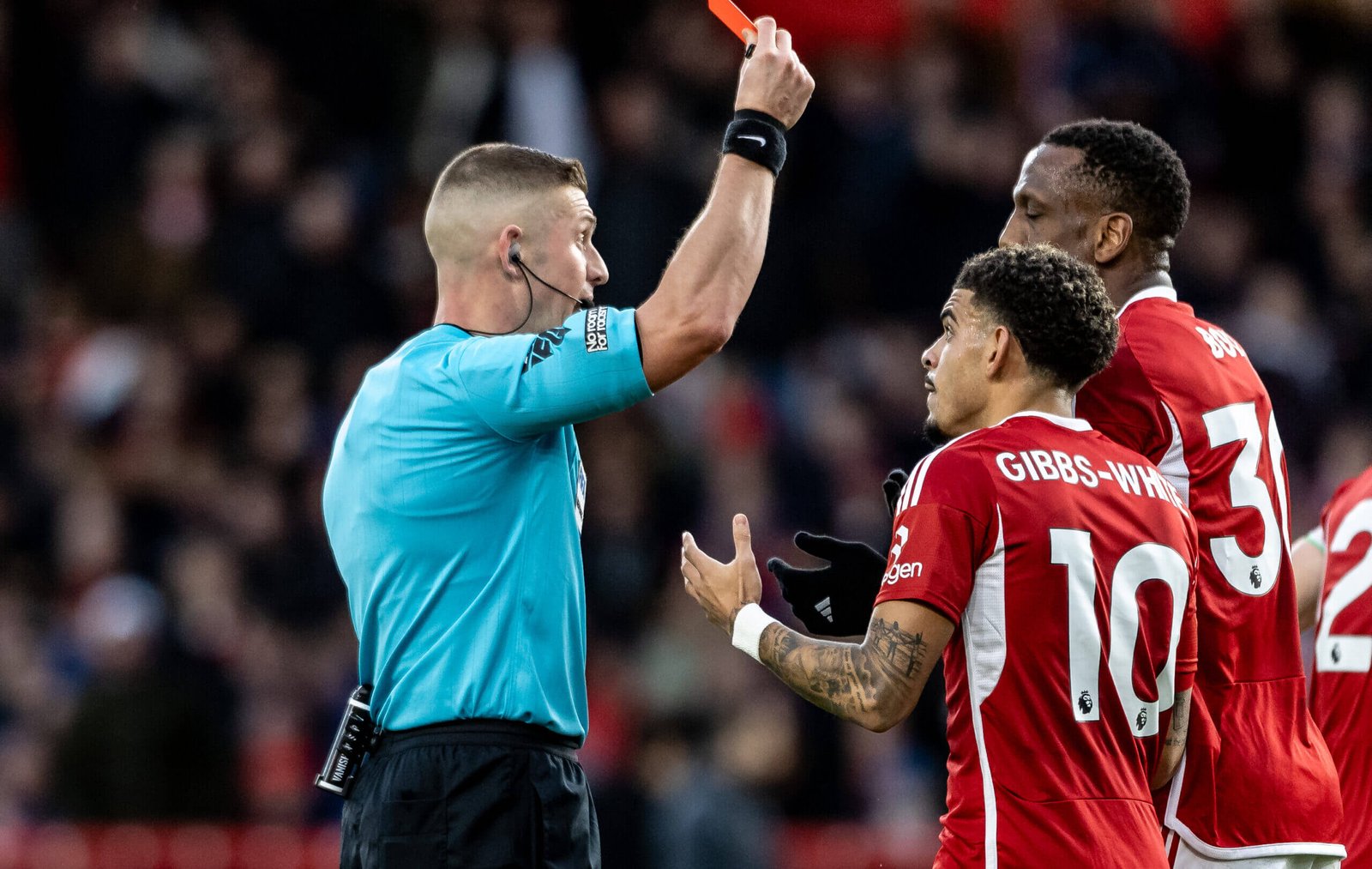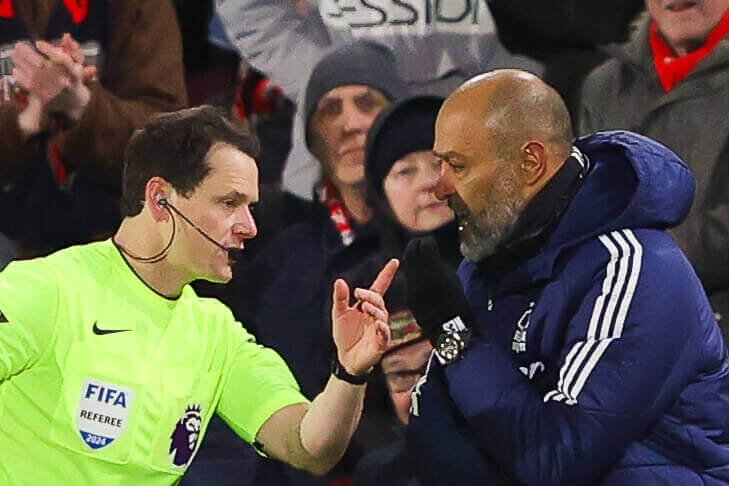After Ivan Toney’s controversial goal for Brentford last weekend, Nottingham Forest sent their third letter of complaint to PGMOL, the referees’ body, this season.
Considering it’s only January, you could conclude that Forest will simply throw their toys out of the pram whenever decisions go against them.
However, behind the scenes, there is far more than a sense of injustice motivating the club’s hierarchy as they find themselves again asking questions of the Professional Game Match Officials Board (PGMOL).
Head coach Nuno Espirito Santo has seen refereeing decisions form a major talking point in two of his six games in charge. Although Forest say they were hugely frustrated by Toney’s goal, they insist their main hope is that speaking out will inspire positive changes in the game and, more specifically, the way the video assistant referee (VAR) system is used.
Here, we look at the complaints, why Forest have sent them in and how the PGMOL has responded.
Why have Forest complained?
Partly through a sense of frustration and injustice, but their actions are also partly inspired by a desire for change.
Some called Toney “clever” for how he twice moved the ball — as well as the marker foam put down by referee Darren England — to give himself an advantage in Brentford’s 3-2 win over Forest last Saturday evening.
Nuno admitted his defensive wall could have responded better and could have alerted England to what the Brentford striker was doing.
But Forest’s main source of frustration was that the VAR could not intervene, even though hundreds of thousands of people watching the match live on television around the world will have seen Toney break the rules and get away with it.
Forest hope their complaint amounts to constructive criticism and helpful feedback.
Ivan Toney moved the ball before scoring his free kick against Forest (Clive Rose/Getty Images)
When else have Forest complained?
The other two were about match official Rob Jones.
In August, Forest raised concerns over two decisions made by Jones when he was the lead VAR for their 3-2 defeat at Old Trafford.
Forest defender Joe Worrall was shown a 67th-minute red card by referee Stuart Attwell after Bruno Fernandes was deemed to have been denied a goalscoring opportunity. Worrall was looking at the ball, rather than the Manchester United player, before a tangle of legs brought both players down — and it could be debated whether Willy Boly was a covering defender.
After that incident, Danilo was judged to have brought down Marcus Rashford, with Fernandes later scoring a winning penalty. But Rashford had seemingly instigated the minimal contact with Danilo himself.
Then, on December 23, Jones was the referee when Boly was shown a second yellow card — and so sent off — against Bournemouth in what was an obvious and significant error of judgement.
Boly slid in to win the ball in a challenge with Adam Smith, who seemed to catch the Forest man on the ankle.
The red card left Nuno’s men to play 67 minutes with 10 men and the game ended in a 3-2 defeat, as Bournemouth scored a stoppage-time winner.
In the aftermath, Forest requested that Jones no longer be put in charge of their games.
How has the PGMOL responded?
The PGMOL has replied each time Forest have written to it.
There was a slight delay after they had contacted the PGMOL to outline their concerns following the events at Old Trafford. But this was only because Forest had initially sent their letter the old-fashioned way, via ‘snail mail’, and it had got lost in the post.
The PGMOL has explained the rules and regulations that underline the decisions made and how the VAR does not have the power to influence them in some cases. Forest generally receive reasonably in-depth replies when they contact the PGMOL to raise concerns. The club do not perceive there to be any lack of willingness to engage or be transparent.
The PGMOL’s chief refereeing officer, Howard Webb, contacted Nuno after the Bournemouth game to apologise about the decision to send off Boly.
Why do Forest keep making complaints?
Behind the scenes at Forest, there is a feeling that refereeing decisions are having a detrimental impact on the Premier League in general. They know other clubs have raised concerns, including Liverpool and Arsenal.
But Forest believe there is too much at stake in the Premier League for officials’ errors to go unchecked. They want to encourage a rise in standards from match officials and help the PGMOL improve a system that is still relatively new and evolving.
Forest think they were previously seen as a club who would just roll over and accept injustices. Now they want to have a voice — not just complain when wronged but to be a catalyst for change.

Rob Jones shows Boly a red card (Andrew Kearns – CameraSport via Getty Images)
At the City Ground, there is an appreciation that Webb has a difficult job and that his inbox must be overflowing on Monday mornings with reactions to decisions made in games over the previous weekend.
But Forest hope that any complaints — not just from themselves but other clubs — will lead to improvements from match officials and, potentially, a review of the laws of the game.
For example, they would like to be able to appeal red cards given to players for two yellows. There is also the impact of clubs then not being able to appeal against the resulting suspension: Boly missed the 3-1 win over Newcastle because of that red card against Bournemouth three days earlier, even though Webb had issued an apology over the incident.
After the Brentford defeat, Forest wanted to ask why the VAR could not intervene if he had seen that Toney had changed the position of the ball. The game’s laws dictate that only the referee can determine where a free kick should be taken and whether it has been taken from the correct position. England, the referee, explained as much to club officials following the game.
Forest would also like to encourage a change in the rules that would allow VAR officials to take action in situations such as the one where Toney could be seen gaining an advantage by moving not only the ball but also the marker foam England had sprayed on the pitch.
Such changes could not be sanctioned by the PGMOL. They would have to be made by the International Football Association Board (IFAB), the body that determines the laws of the game worldwide, and the Football Association. Forest continue to raise their concerns in the hope it will spark a conversation that ultimately leads to change.
Forest are aware that IFAB might have concerns about introducing too many changes to what VARs can influence during games, as it could lead to more delays.
But that would not have been the case with either the Boly sending-off — as his challenge would have been reviewed to assess whether it should have been a straight red card anyway — or the Toney incident.
What is PGMOL’s perspective on complaints?
PGMOL say it “actively encourages feedback” from clubs, which is a message that has been repeated by Webb.
Webb visited every club after he took the job in August 2022 and likes to remain in regular contact to answer any questions they might have.
The PGMOL is reluctant to discuss individual cases with the media or publicise the conversations it has with individual clubs.
An independent five-person ‘key match incident’ (KMI) panel meets every week to analyse the big decisions made by referees. The verdicts of the panel are sent to clubs every Thursday. It is down to clubs, rather than the PGMOL, to decide whether to make that information public.

Referees’ chief Howard Webb (Dave Thompson/Getty Images)
Do Forest complain more frequently than most clubs?
Perhaps. But it is impossible to be certain, as other clubs may not make theirs public. What we do know is that other clubs have made high-profile complaints to the PGMOL.
Arsenal manager Mikel Arteta was charged by the FA over comments he made following a 1-0 defeat at Newcastle United on November 4. Arteta labelled the VAR’s failure to rule out Anthony Gordon’s winning goal “an absolute disgrace”. The VAR had checked whether the ball had gone out of play before Joe Willock had crossed in the move leading to the goal, whether Joelinton had fouled Arsenal defender Gabriel Magalhaes as the delivery arrived in the penalty area and whether Gordon had been offside.
After the match, Arsenal released a statement complaining about officiating standards but Arteta was cleared of the FA charges.
Liverpool also released a statement after a Luis Diaz goal was wrongly ruled out against Tottenham Hotspur in September.
(Top photo: James Gill – Danehouse/Getty Images)
Read the full article here


